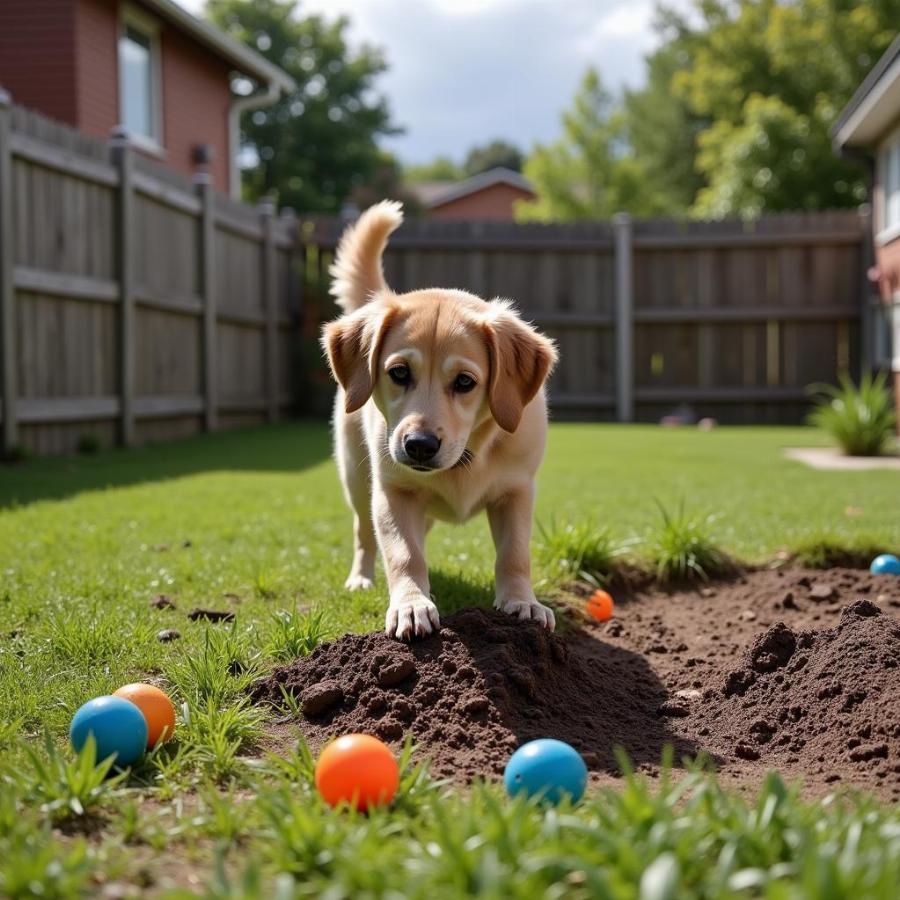Dogs eating soil, also known as geophagia, can be alarming for owners. While it might seem strange, this behavior isn’t always a cause for concern. Understanding why your dog eats soil is key to addressing the issue effectively. This article will delve into the various reasons behind this behavior, ranging from nutritional deficiencies to underlying medical conditions, and offer guidance on how to manage it.
Understanding the Reasons Behind Soil Consumption
Several factors can contribute to a dog’s dirt-eating habit. One common reason is a nutritional deficiency. If your dog’s diet lacks essential minerals like iron or other nutrients, they might instinctively seek them out in soil. Another possible cause is boredom or stress. Just like humans might engage in nervous habits, dogs might turn to soil eating as a coping mechanism. Furthermore, underlying medical conditions such as anemia, inflammatory bowel disease, or even pancreatic issues can manifest as pica, the compulsive eating of non-food items like soil.
Nutritional Deficiencies and Soil Eating
If your dog’s diet isn’t providing adequate nutrients, they might resort to eating soil to supplement their intake. For example, soil can contain minerals like iron and potassium, which are vital for a dog’s health. A blood test can help determine if your dog has any nutritional deficiencies. If a deficiency is identified, adjusting their diet with high-quality dog food or supplements, under the guidance of a veterinarian, can help curb the soil-eating behavior.
Behavioral Reasons for Eating Dirt
Sometimes, the reason for soil eating is purely behavioral. A bored or anxious dog might find digging and eating soil a stimulating activity. Providing adequate mental and physical stimulation through playtime, exercise, and interactive toys can help alleviate boredom and redirect their attention away from eating soil. Consider enriching their environment with puzzle toys or engaging in training sessions to keep them mentally occupied.
 Bored Dog Eating Soil in Backyard
Bored Dog Eating Soil in Backyard
Medical Conditions and Pica
In some cases, soil eating can be a sign of a more serious underlying medical condition. Pica, the compulsive eating of non-food items, can be associated with conditions such as anemia, inflammatory bowel disease, or even certain types of cancer. If your dog’s soil-eating habit is persistent or accompanied by other symptoms like vomiting, diarrhea, or lethargy, it’s crucial to consult a veterinarian immediately for a thorough diagnosis and appropriate treatment.
How to Stop Your Dog From Eating Soil
Addressing the underlying cause is the most effective way to stop your dog from eating soil. If a nutritional deficiency is suspected, dog feeding mat can be helpful in promoting healthy eating habits. For behavioral reasons, providing more reusable female dog diapers and mental stimulation can often resolve the issue. In cases of medical conditions, following the veterinarian’s prescribed treatment plan is crucial. Additionally, making the soil less accessible by covering bare patches in your yard or using deterrents can also help discourage the behavior.
Why is my dog suddenly eating dirt?
Sudden changes in behavior, like eating dirt, can be triggered by various factors, including changes in diet, new stressors in their environment, or the onset of an underlying medical condition.
What is the best way to prevent my dog from eating soil?
The best prevention strategy depends on the cause. Ensuring a balanced diet, offering ample exercise and mental stimulation, and addressing any underlying medical conditions are key. You could also try using dog belly bands male to restrict access to certain areas.
Is it harmful for my dog to eat small amounts of dirt?
While small amounts of dirt might not cause immediate harm, persistent soil consumption can lead to gastrointestinal issues or expose your dog to parasites and toxins.
Can eating soil be a sign of anxiety in dogs?
Yes, soil eating can be a coping mechanism for anxiety or stress in dogs, similar to nervous habits in humans. You can consider using a 7 way dewormer for dogs as a preventative measure.
When should I contact a vet about my dog eating soil?
If the behavior is persistent, excessive, or accompanied by other symptoms like vomiting, diarrhea, or changes in appetite, consult a vet immediately. Knowing if does dog urine kill plants may also be important for maintaining a healthy yard for your dog.
Conclusion
Understanding why your dog eats soil is essential for addressing the issue effectively. By considering nutritional, behavioral, and medical factors, and working with your veterinarian, you can help your furry friend overcome this habit and maintain a healthy and happy life. Remember, addressing the root cause is key to long-term success.
FAQs
- Is it normal for puppies to eat dirt? While puppies might explore their environment by mouthing objects, including dirt, persistent dirt eating should be addressed.
- Can certain types of soil be more harmful than others? Yes, soil treated with fertilizers or pesticides can be toxic to dogs.
- What are the signs of mineral deficiency in dogs? Signs can vary but may include changes in appetite, weight loss, lethargy, and dull coat.
Other helpful articles:
- Dog Nutrition and Diet
- Understanding Dog Behavior
- Common Canine Health Issues
Beaut Dogs is your go-to resource for all things related to dog care. We provide expert advice and guidance on a wide range of topics, from choosing the right breed to providing comprehensive care instructions. For any further assistance or personalized advice, please contact us at [email protected]. We’re here to help you navigate the wonderful world of dog ownership. Visit Beaut Dogs (https://beautdogs.com) today!